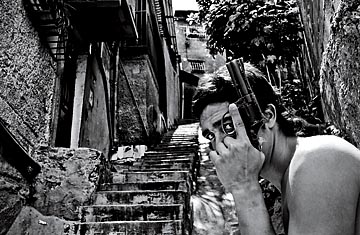
A gang member poses with a gun in Caracas. Some 50 homicides occur in the city each week.
(4 of 4)
The Bolibourgeoisie
Meanwhile, the Chavistas haven't exactly displayed a Marxist aversion to the petrocorruption they once decried. The hypocritical emergence of a wealthy cohort of "Bolivarian revolutionaries" known as the Bolibourgeoisie and moguls called Boligarchs came into full view five years ago when a pro-Chávez millionaire businessman traveling with PDVSA executives was caught at a Buenos Aires airport with a suitcase carrying $800,000 in cash.
Chávez has ordered some corruption arrests, but critics note that his relatives have turned his home state of Barinas into a family fiefdom, including the questionable acquisition of large parcels of land when Chávez's father was governor in the 2000s. (They deny any wrongdoing.) In Caracas, government officials are regularly spied driving luxury cars to bistros in trendy zones like Las Mercedes. "During the day they wear red berets," says Castro in Catia, "and at night they wear Rolexes." She's not far off, according to the Berlin-based watchdog Transparency International, which ranks Venezuela 172 out of 183 nations on its corruption index.
That's not to say the opposition has totally cleaned the sleazy pre-Chávez era from its shoes. The Capriles campaign was rocked by a recently released video showing an official taking a cash-stuffed envelope from the agent of a shipping magnate. Capriles immediately fired the aide, but the episode was a reminder that until now, Chávez benefited from clueless opposition leaders. Capriles in fact is irked at some conservative backers for trying to de-legitimize the election by calling the voting process fraudulent — even though international observers don't foresee problems and Chávez relies on transparent balloting to counter charges that he's a tyrant.
Still, Capriles was nominated in an unusual, unified opposition primary. That, and not just Chávez's cancer, has the revolution spooked. So Chávez takes every opportunity to declare the inevitability of his victory. Any other result, he warns, would be robbery — probably perpetrated by the U.S. There is a conspiracy afoot, he said in August, "to deny the people's triumph."
The potential for postelection unrest is great no matter who wins, especially since Chávez's Defense Minister has hinted that the armed forces might not recognize an opposition victory. But Chávez's biggest threat isn't foreign; it's the plagues at home, like the rampant violent crime. Chávez is finally responding: he recently banned gun sales and inaugurated a new law-enforcement academy, located, fittingly, in Catia. It arrived too late for mothers like Luz Marina Morón. The question is whether it comes too late for Hugo Chávez.
